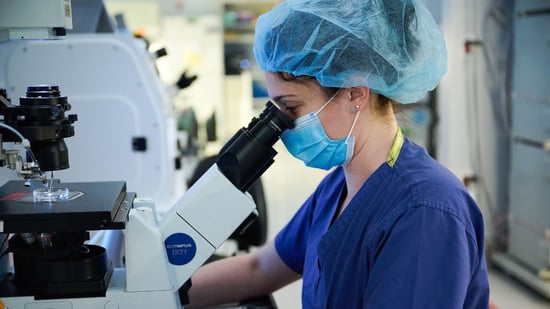April 20th, 2023 | 9 min. read
What is the first thing you do every morning?
We wash our hands! After changing into our fresh scrubs, hair nets and shoe covers, the very first thing we do after we open the door into the laboratory is head straight to the sink.
Sterility and cleanliness are integral to success of our patients.
Who do you work with throughout the day?
We have a super tight network of team members! We all work together, from the front desk staff all the way to the laboratory, to ensure the very best outcome for each patient.
While embryologists don't get to interact with patients face-to-face as much as andrologists and other team members at Illume, what you may not realize is that we're right on the other side of the wall each time you have an egg retrieval or embryo transfer!
We're evaluating and counting eggs as the doctor retrieves them or preparing and verifying embryos before carefully handing them off to your doctor, for example.
Fun fact: At Illume Fertility's Norwalk, CT location, we have both an Embryology Lab and an Andrology Lab in-house!
What types of procedures do embryologists perform?
It’s worth mentioning that we all rotate and share responsibilities, so no one day is the same for us. I can perform any laboratory-specific procedure offered when a patient is coming through for IVF. It’s very hard to list them all!
However, they range from procedures like oocyte (egg) retrievals and embryo transfers, thawing or freezing oocytes or embryos, all the way to Intracytoplasmic Sperm Injection (ICSI) and embryo biopsy.
While your doctor may be the one interacting directly with you during a procedure like an egg retrieval or embryo transfer, us embryologists work very closely with them throughout the entire process!
How often do embryologists interact with fertility patients?
There are two types of procedures where we meet and interact with our patients: the oocyte (egg) retrieval, and the transfer of embryos. At both times, we are primarily meeting the patients for identification and verification of the procedure we are doing.
Is being an embryologist stressful?
Being an embryologist is very high stress! It is not a position to be taken lightly.
Calmness comes with time and practice. I would say the hardest part of our work is finding the delicate balance between stress and calm. Stress reminds us how important our job really is, but calmness and steadiness are necessary to perform procedures well.
What is your favorite thing about being an embryologist?
Seeing patients have successful outcomes - whether it ends with them freezing their eggs, having a baby, or whatever their goals may be, it keeps me grounded and reminds me of how important what I do is. It is easily the very BEST part of my job!
Do you perform lab checks at specific times?
Most definitely! Each procedure happens in a specific sequence of time, particularly on the very first day of retrieval or thawing. Oocytes (eggs) are very sensitive, so we take extra care with timing each step to optimize a patient’s cycle and give them the best chance of success.
What is the coolest part of your work?
We have the unique opportunity to share a small glimpse of what we see every day with our patients at the embryo transfer. We extend our display of the microscope view to the patient awaiting transfer, and this is when they get to verify their embryo and see their embryo being loaded into the catheter in real time, as we do it.
In my opinion, this is one of the coolest, most unique experiences that we share with our patients.
What is the last thing you do at the end of the day?
The last thing we do is check that every incubator is closed. As an added safety measure, we also gently tap the outside or run our fingers along the doors to make sure that each one is 100% closed before we leave the lab.
Did you know? Illume Fertility's on-site cryopreservation storage facility and labs have an extremely sensitive 24/7 monitoring system to ensure all of our patients' eggs, sperm and embryos stay safe every hour of the day.
Each Embryologist Cares About Your Success
Even though lab staff don’t have the opportunity to meet every single patient since they mostly work behind the scenes, Erin says she wants fertility patients to know that each time she and her team perform a procedure, it's personal:
"We are always looking for those positive outcomes and love seeing the results of our laboratory procedures come full circle," she says. "Though we work to help many different patients each day, we recognize your names and stories, and are always rooting for you!"
A huge thank you to our entire Embryology Team for their hard work and dedication, and to Erin for giving us a glimpse behind the scenes of a typical day in the IVF lab. Pretty incredible, right?!

